Patti Smith and Phillip Glass
Footnote to Howl: Dedication to Allen Ginsberg. At Campbell Hall, Saturday, February 14
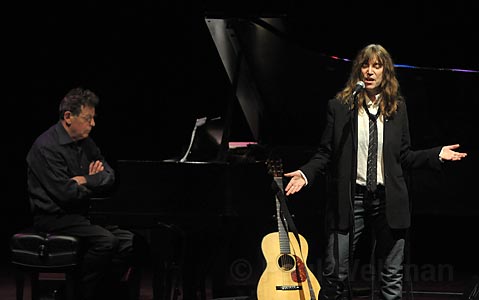
Respectively referred to as the Godmother of Punk and the Father of Minimalism, the significance of both Patti Smith and Philip Glass cannot be exaggerated. Credited for his influential role in the development of minimalist composition and in bringing classical music to the public, Glass is considered one of the most important American composers of the last 50 years. Protopunk poet and singer-songwriter Smith, who first integrated Beat poetry performance style with three-chord rock, was an instrumental component of the art-rock movement that helped to define alternative music as we know it.
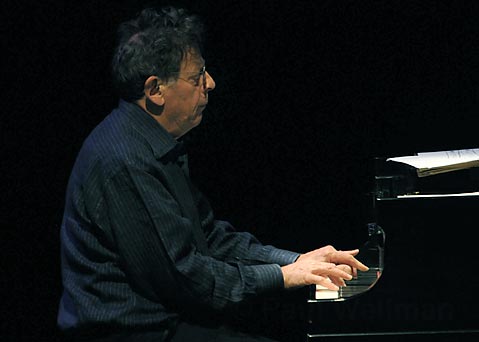
Inspired by their mutual reverence for the work of their late friend and mentor, seminal Beat poet Allen Ginsberg, these two giants of 20th-century music shared the Campbell Hall stage on Saturday for an evening of piano and poetry, a collaboration that originated from their pairing at a memorial for Ginsberg. Though they have on rare occasion reprised the tribute in a handful of venues, the two have no further plans to tour together beyond this lone U.S. performance.
Infusing her recitations with explosive energy, eloquent gestures, and masterful rhythm, Smith surged through selections from Ginsberg’s poetry and her own, floating over a musical response from Glass’s extensive oeuvre. As she has in absorbing Ginsberg’s writings into her own, Smith captured the raw and provocative essence of his aesthetic. And between spewing poetry, she shared anecdotes and bantered charismatically with the audience.
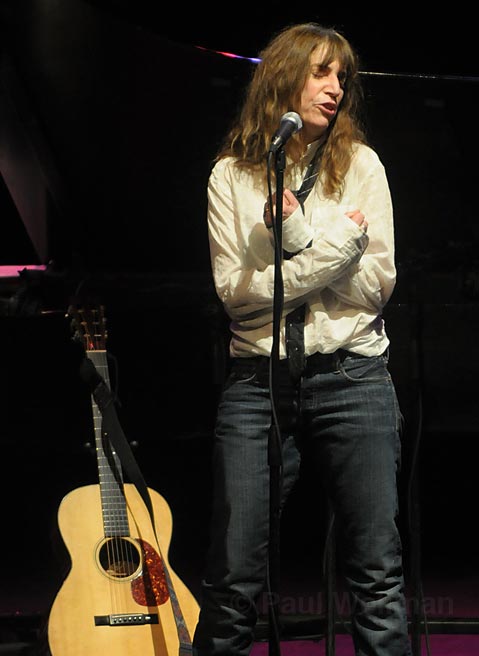
Smith opened the evening with her own call-to-arms, People Have the Power. Paired with excerpts from Glass’s Metamorphoses, her distinctive, powerful voice felt like a call for revolution against the delicately fluttering notes. “The Blue Thangka,” her loving homage to a naturalist whose name she had long since forgotten, married exquisitely with Glass’s serene minimalism. Slipping seamlessly into Ginsberg’s canon, the two performed his raw, profane “Magic Psalm,” conveyed the exuberance of On Cremation of Chgyam Trungpa, Vidyadhara, and careened through the anti-war diatribe Wichita Vortex Sutra, during which Smith’s voice swelled with the force of a preacher at the pulpit, crescendoing with a ferocious declaration and retaining passion as it dropped to a whisper to close the piece. Glass meticulously followed each verse on piano, speaking only through the keys, yet preserving his own distinct voice.
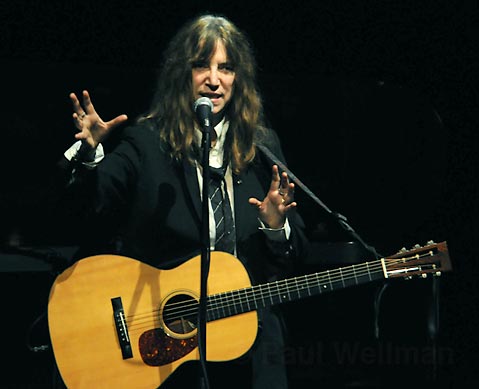
In addition to their poetic pas de deux, each artist performed a solo segment. Less loquacious than Smith, Glass mumbled a brief introduction to his compositions, Night on the Balcony from Jean Genet‘s The Screens, and tudes Nos. 2 and 10. His sumptuous melange of sinuous harmonies and mesmerizing refrains read like melodic poetry and left the audience spellbound.
Supported on acoustic guitar and mandolin by her longtime collaborators Lenny Kaye and Santa Barbara native Jay Dee Daugherty, Smith tore through her own classics, “Beneath The Southern Cross” and the snarling, strident “My Blakean Year” before dedicating a touchingly gentle cover of Neil Young’s “Helpless” to her late husband, Fred “Sonic” Smith. She then invited the audience to sing along with her impassioned encore rendition of the well known “Because the Night.”
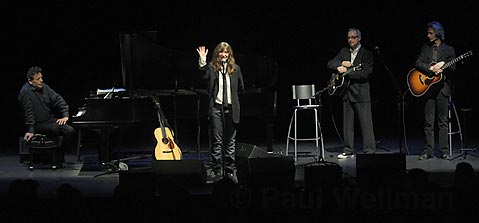
Closing the evening with “Footnote to Howl,” the denouement to Ginsberg’s ranting poem, Smith added “Holy Santa Barbara” to the poem’s listed cities, confirming that even as the night belonged to her, Glass, and the spirit of Ginsberg, in that brief moment, these American legends also belonged to us.



